Content
Mushrooms are a wonderful product that can be a worthy alternative to meat or fish in the kitchen. They can be used in the preparation of the first, second course, various snacks. You can find mushrooms in the forest or at the store counter, but the best way to stock up on fresh produce is to grow it yourself. A mushroom like oyster mushroom grows well in open and protected ground. So, oyster mushroom cultivation on stumps will not be difficult and will delight you with a good harvest. We will talk about the rules of such cultivation later in the article.
Oyster mushrooms on stumps: possible cultivation methods
Oyster mushroom is one of the most "tame" types of mushrooms. Man has long learned to grow it in his garden and even in a greenhouse. Growing oyster mushrooms in open, unprotected ground is called the extensive method. It does not require significant financial costs, but the harvest allows you to get only seasonal. The intensive cultivation method allows mushrooms to be grown in the protected conditions of a greenhouse or, for example, a basement. The method is more laborious, but effective, since the harvest can be obtained all year round, regardless of the season.
Growing oyster mushrooms on stumps can be carried out according to the intensive and extensive method, because the stump in this case acts as the basis for the propagation of the culture. And the stump does not have to be stationary, because mushrooms grow well on separate pieces of solid wood or other lumber, for example, on sawdust.
Stages and rules of cultivation of oyster mushrooms on stumps
Oyster mushroom is distinguished by its unpretentiousness. In nature, it can be found on oak, mountain ash, linden, alder and other deciduous trees. If there is a fruit tree stump in the garden, then it can also be used as a basis for growing mushrooms. In the absence of natural hemp, you can stock up on artificially prepared wood chunks.
For some owners, oyster mushroom can be a real assistant in cleaning the garden from unnecessary stumps. Indeed, literally in 2-3 years, this culture makes dust from a fresh stump, which allows you to avoid uprooting.
Having decided to grow oyster mushrooms, you need to remember that they do not tolerate direct sunlight, therefore the best place to cultivate them is a shaded area of the garden or a ventilated, illuminated cellar. In the case when it comes to using a stationary stump or it is not possible to place artificially cut hemp in the shade of trees, you can use a trick and install an artificial canopy.
Stump preparation
You need to take care of growing oyster mushrooms at the end of winter or with the onset of early spring. If a naturally created, stationary stump in the garden was chosen as the basis, then the period of its preparation and planting of the mycelium falls on April-May. The temperature at this time must be consistently warm to preserve the planting material. If you plan to grow oyster mushrooms on separate, artificially created stumps, then at home you can take care of applying mycelium at the end of winter. This will speed up the harvesting process.
You can artificially prepare hemp for growing oyster mushrooms from freshly sawn or already dry trees. The only condition in this case is the absence of mold.The stump can be of various sizes, but it is preferable to use chocks with a length of 30-50 cm and a diameter of 15-30 cm.
A prerequisite for the normal development of the mycelium is the high moisture content of the wood. So, fresh wood chunks, as a rule, have the required level of humidity, but dry or long-cut logs must be soaked in water for several days. In this case, the wood will be able to absorb the required amount of moisture inside.
Sowing methods with mycelium
There are at least four different ways to add mycelium to the stump:
- Sealing of grain mycelium into holes. This method is quite simple. Most often used when working with stationary stumps. They need to make rounded holes with a diameter of not 8-10 mm and a depth of 5-6 cm. It is convenient to use a drill for this. Round holes can be replaced with cuts of the same depth. In the holes obtained, you need to push the grain oyster mushroom mycelium and cover them with moss or tape them up. This method of infecting stumps with oyster mushroom mycelium can be seen in the video clip:
- Using mycelium on a bar. If the mycelium is deliberately applied to a wooden block, then you need to make a hole of the appropriate size and insert a piece of wood into the stump. In this case, it is imperative to seal the hole with a piece of moss or sawdust.
- Application of mycelium to the stump cut. To implement this method, you need to cut a disk of wood from the stump, 2-3 cm thick. Sprinkle grain mycelium on the end of the cut and close the cut with a wood disk. It is recommended to fix the disc with nails.
- Hemp wood column. This method allows you to grow a large number of oyster mushrooms in a limited area of the site. The technology involves cutting one long tree trunk into several stumps, between which grain mycelium is sprinkled. Composing the stumps again into a single trunk, the seams are connected with nails. Such a column of stumps can be up to 2 m high. It will be stable if you choose wood with a large diameter (more than 20 cm).
Hemp with mycelium (except for columns) must be wrapped with burlap, matting or perforated film. Place them in your basement, shed, or closet. The optimum temperature for oyster mushrooms at this stage of growing is +150C. At the same time, it is important to maintain the high humidity of the stumps themselves and the air in the room.
It is necessary to store columns with mycelium a little differently. This is primarily due to the dimensions of the created structure. Proper storage of columns involves placing them vertically in several rows with small gaps. The free space between the columns is filled with wet straw or sawdust. Along the perimeter, rows with stumps are wrapped in burlap or perforated film. On top of such a "planting" it is also necessary to pour a layer of wet sawdust or straw.
Store hemp with oyster mushrooms in a room with good air circulation. At the same time, drafts can harm the entire growing process. It is also recommended to monitor the level of humidity in the room, periodically spraying it with water. The storage period should be 2-3 months. That is why it is recommended to prepare artificially created hemp at the end of winter, so that even with the arrival of stable warm planting temperatures, it can be taken out into the garden.
Stationary stumps in the garden can be infected with oyster mushroom mycelium with the arrival of spring. The recommended infection period is April-June. As a basis, you can use the stumps of apple trees, pears and other fruit trees. The hemp selected for growing oyster mushrooms must be healthy, and there must be no signs of other fungi on their surface.
It is possible to introduce mycelium into the stump using the technologies proposed above, the only difference is that the wood does not need to be wrapped with burlap or any other material. Holes or slots in the hemp are made closer to the surface of the ground. From the upper cut, you need to retreat at least 4 cm.
Placing hemp with oyster mushrooms in the garden
A few months after the mycelium is added to the stump, provided that it is stored correctly, a white bloom appears on the surface of the wood. It indicates the formation of the body of the fungus. At this time, you can take out the stumps to the garden, to open areas of land. As a rule, they do this in May. Oyster mushrooms are placed under the crown of tall trees, in the shade of arbors, under a canopy.
Prepare a place for placing hemp with oyster mushrooms as follows:
- Make a shallow hole or trench in the ground.
- Put wet foliage or sawdust at the bottom of the pit.
- Install and cover the hemp with soil to a height of 10-15 cm.
- The distance between two nearby stumps in the same row should be at least 30 cm.The distance between the rows should be more than 50 cm.
Separately infected stumps can be stacked on top of each other to save space in the garden, forming a wall of several tiers. Columns with oyster mushrooms can be connected to each other according to the principle of a solid wall using wire or nails. This wall can be installed both vertically and horizontally on the ground.
Another option for sowing hemp with oyster mushrooms
You can add oyster mushroom mycelium to hemp at any time of the spring-autumn period. In this case, you can use a very original and productive way of infection. It can be done as follows:
- choose a place for growing oyster mushrooms in a shaded area of the garden;
- dig a trench 15-20 cm deep;
- pour boiled millet or pearl barley at the bottom of the trench;
- sprinkle pre-mashed grain mycelium on top of the cereal, with a layer of at least 1 cm;
- install pre-prepared hemp of wood vertically or horizontally in a trench on top of the mycelium;
- lightly press the stumps into the trench and dig in with garden soil.
The proposed method is quite simple and allows you to create an entire oyster mushroom plantation on the site at any time of the warm period. If you take care of planting in the spring, then by the fall you can expect a mushroom harvest. Otherwise, it will be possible to feast on mushrooms only next year.
Crop care and harvest
To obtain a full-fledged harvest of mushrooms, it is very important to properly care for oyster mushrooms in the first year of cultivation. The humidity level should be monitored especially carefully. Dry soil must be watered regularly until the end of the fruiting period. With a decrease in temperatures with sufficient humidity, within a week from the moment the rudiments of the fungus body appear, it will be possible to start harvesting.
Oyster mushroom on stumps does not require any special preparation for the winter period. Hemp winter safely in open areas of the ground without insulation. Oyster mushroom mycelium in such conditions can exist for 5-6 years. The maximum mushroom yield can be observed in the second year of fruiting.
Oyster mushrooms all year round on stumps in a greenhouse
Many farming enthusiasts are wondering how to grow oyster mushrooms on stumps all year round. But such cultivation is quite possible in the presence of a heated greenhouse. In such artificial conditions, oyster mushrooms are grown on an industrial scale. It's all about temperature and humidity regulation. Oyster mushrooms on stumps in a heated greenhouse or lighted cellar can be grown under the following conditions:
- For growing in a heated greenhouse, hemp is sown with mycelium in October-November using any of the above methods.
- The stumps are buried in the greenhouse soil by 10-15 cm.
- At the initial stage of growing oyster mushrooms, the temperature in the greenhouse must be kept at the level of + 14- + 150C. The humidity should be 90-95%. In such conditions, the oyster mushroom mycelium should last 1-1.5 months. After this period of time, it will begin to form the body of the mushroom.
- During the germination of the mycelium, it is necessary to reduce the temperature in the room to 0- + 20C. Such conditions for 2-3 days will contribute to accelerated fruiting.
- After a few days, the temperature in the greenhouse needs to be increased to + 10- + 140C and keep until the end of fruiting.
- The temperature cycle in the greenhouse can be repeated an unlimited number of times. The fruiting cycle of oyster mushrooms on stumps in a heated greenhouse is 2-2.5 months.
Growing oyster mushrooms on stumps in a greenhouse allows you to feast on fresh mushrooms all year round, including in severe winter frosts. A basement or cellar can be an alternative to a greenhouse, but you need to remember that light is necessary for the growth of mushrooms. Otherwise, the stumps will rot without ever yielding a harvest. A good example of growing oyster mushrooms in a greenhouse is shown in the video:
After watching the video, you can learn from the positive experience of a specialist in the field of mushroom growing.
Conclusion
It is quite easy to grow oyster mushrooms at home if you know the basic principles and rules. Tree stumps in this case are the best growing base. Wood holds moisture well and is able to nourish the culture with the necessary substances. You can get an oyster mushroom harvest in the fall in the garden in accordance with the life cycle of the mushroom or all year round in a heated greenhouse. If desired, the mushroom can be used as an assistant to eliminate unnecessary stumps in the area. For several years, the mycelium will repeatedly please with fresh product and destroy wood. How to grow oyster mushrooms on stumps at home is decided by each farmer independently, but we have given several methods and examples of the successful cultivation of this mushroom.
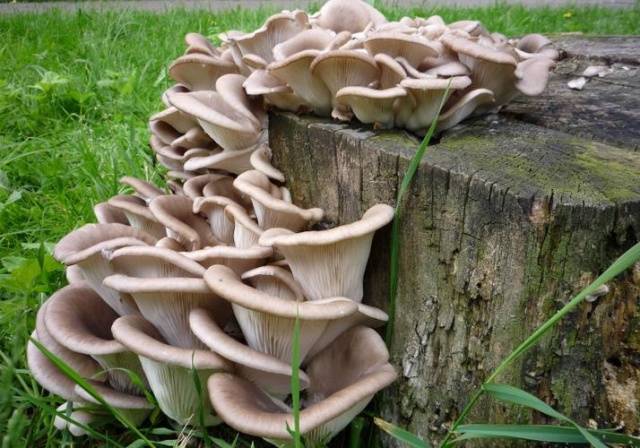
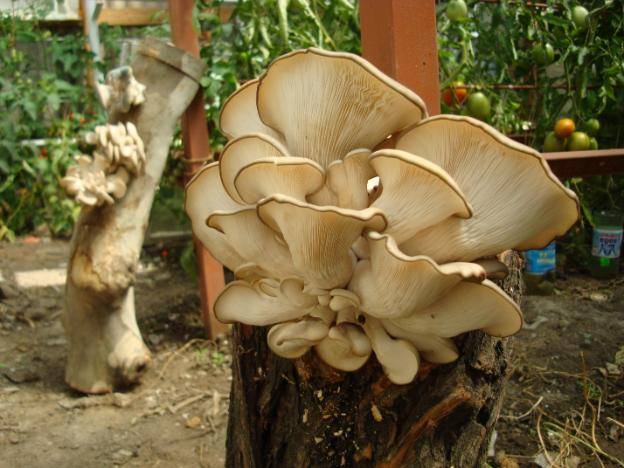
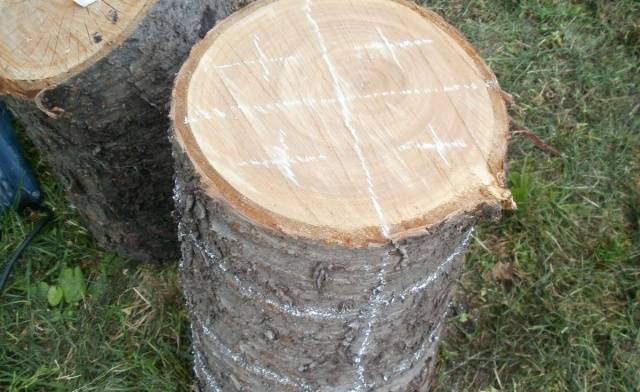
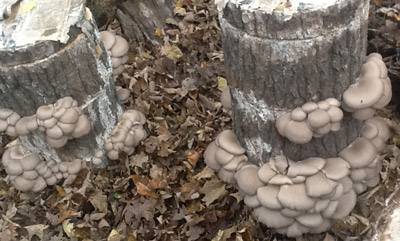
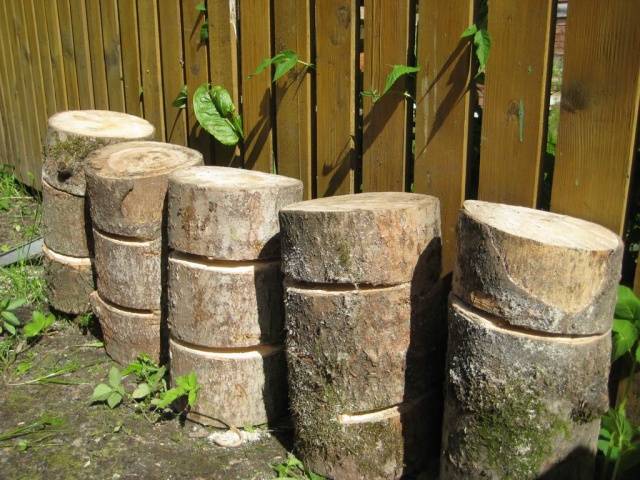
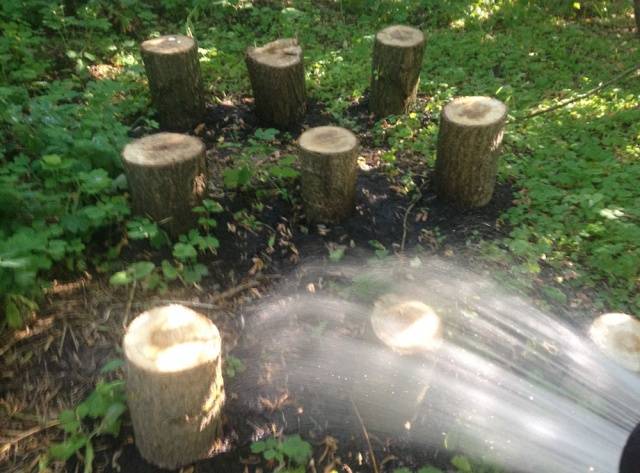
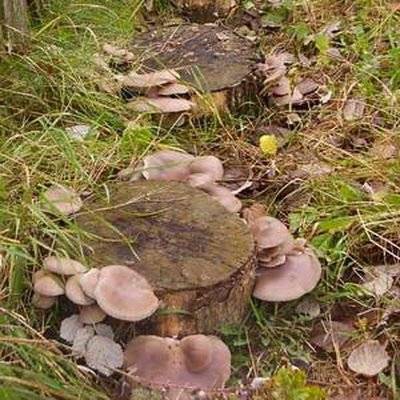
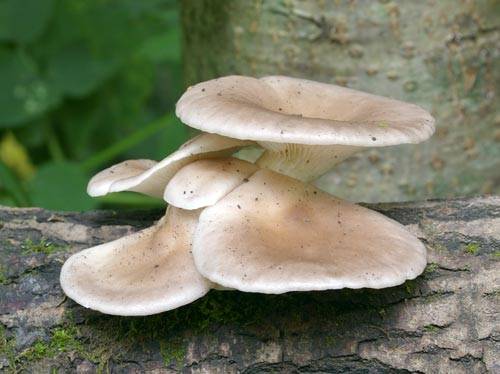
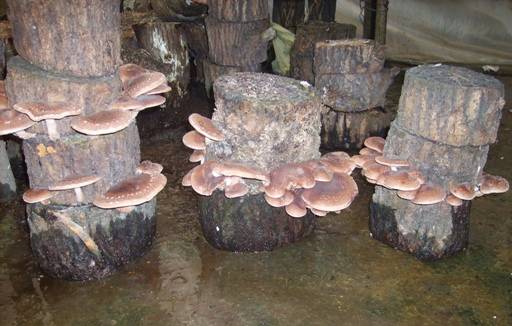

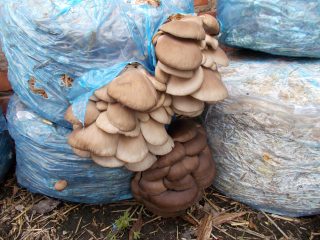


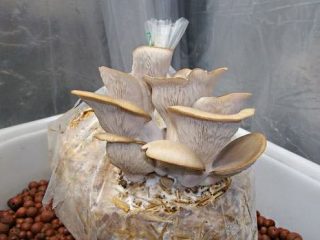



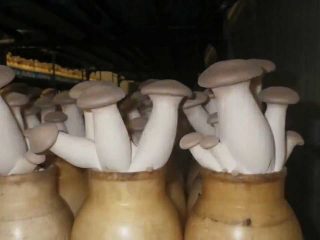
The stump was placed in the city, the mushrooms came out, but beetles ate them (how to get rid of them?
In my opinion, for the germination of the mycelium, it is served up to 22 ° C in the dark, the incubation period is about 2 months, then only as it grows, only after that they reduce ○ ° C to -12-14 ° for growth. Isn't it? Thanks